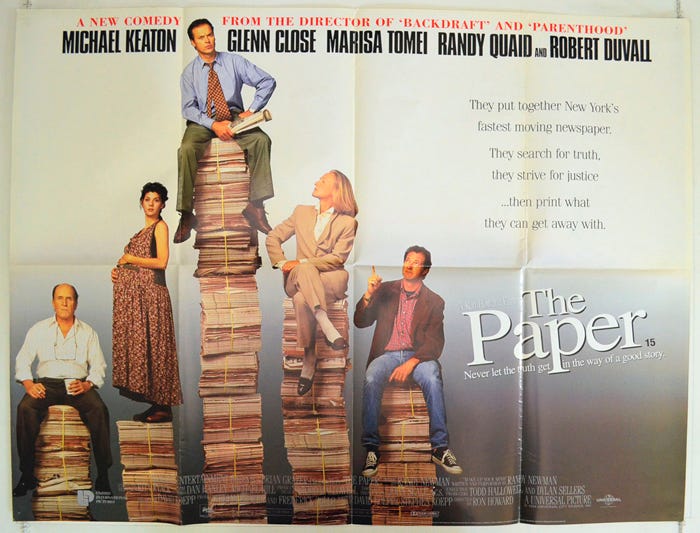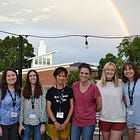"All Cops Wanna Talk" and other things I learned at journalism bootcamp
Advice for any nonfic writer, not just journalists.

I attended World Journalism Institute’s Young Professionals Intensive last month and got some of the best writing advice I’ve ever heard.
I wrote a few weeks ago about my vocational takeaways from the experience.
But I thought some of you writers might appreciate some nuts-and-bolts technical stuff. I’ve included only what seemed fresh, new, and applicable to someone outside of the journalism world. So, voila! Enjoy.
On finding stories
What is newsworthy? Turns out, not just politics, scandal, or celebrity gossip but anything that makes the reader stand up and say, “Good golly!” In other words, anything that makes for a good story.
Once you’ve gotten wind of something interesting, your job is three-fold. You’ll have to dedicate time to:
Interviewing
Observation
Data and documentation (a.k.a research)
On structuring stories
Stories use a variety of different “shapes.” Here are two.
From famed journalist Bob Dotson:
Hey (get the reader’s attention with a compelling lead)
You (convince him the story’s relevant to him)
See (tell the story)
So (point to the wider impacts)
This one is also common:
Tease me (same as “hey”)
Tell me (nut graph: summarize the story in 1-2 sentences)
Prove it (concrete scenes, stats, evidence)
Help me remember it
You may notice that every step of each shape is audience-oriented. Not focused on writing the “right” way but writing in a way that people subjectively enjoy. This focus on high levels of adaptability, this sales mentality, is new to me. The only place I found it previously was in college debate, which focused on adapting arguments to fit the backgrounds and biases of different judges.
On getting sources
If a source won’t talk to you, don’t immediately give up. If you think the story is important, convince them of that. Get them on your side. Or at least ask if they could recommend another person to talk to.
In 1994 comedy The Paper, the main character, who works for a NYC newspaper, is trying to get his reporters to investigate an unjust arrest. He does a good job summing up this persistence:
“Carmen, you have to get a quote."
“Henry, I can't even get past the desk sergeant.”
“All cops want to talk. They just don't know they want to talk. Tell them.”
On interviewing sources
Use silences and nudges to get beyond talking points to the deep stuff.
Silences: *long pause after asking a hard question*
Nudges: “Tell me more.” or “What do you mean by that?”
I see the reporter as a kind of storytelling coach to whomever he interviews. Within an hour, he must get a story out of somebody who isn’t necessarily used to putting their experiences into words. This requires good social skills and instincts.
Other tips:
Try to ask questions that get at inconsistencies, doubts, fears, concrete details, and personal transformation.
“Did you ever think you might be wrong about that?”
or “What changed your mind?”
or “How did you feel when…?”
or “What was the weather like that day?”
On telling stories
The journalist’s motto is: Sensational facts + understated prose.
When the reporting and organization are done right, the story should speak for itself without any literary flourishes. As a nonfic storyteller, you’re not creating a starry night ex nihilo. You’re more like an astronomer, tracing patterns in the stars to reveal the shapes of constellations. Once you do that, your readers will be able to remember the stars much better.
Some technical tips that fall under that philosophy’s umbrella:
Center your story on a face, something personal with concrete details.
Find a theme to tie those details together.
Write short sentences.
Instead of summarizing, use synecdoches with strong action verbs. (Don’t say he was mad. Say he punched a wall.)
Every word must tell.
Slice all unnecessary details.
I hope those tips were illuminating for those of you who, like me, have no formal journalism education. It’s a different way of thinking, for sure, but I find it no wonder that American greats like Hemingway, Mark Twain, Joan Didion, and George Orwell worked as journalists before they wrote their novels. Telling true stories day-in and day-out is good practice for telling convincing lies.
Blog Update
From now on, I’m dropping from an essay a week to an essay a month. Now that I’ve proven to myself that I can consistently write essays once week, I’m gonna scale back in order to:
Read more. This is the consequence of Substack community, which produces top notch stuff (both content and media recommendations) that I often forgo due to time constraints. I’ll probably be commenting on your-all’s posts more frequently this year.
Write less (but aim for higher quality).
My most dedicated readers ought to breathe a sigh of relief. You’ll no longer be drinking from a fire hose ;-)






Really appreciated this. Journalist-style interviewing is something I would like to do more of someday. One thing that has always somewhat annoyed me with interviews is how it can at times seem like the interviewer is "priming the pump" and asking leading questions to get a certain kind of answer or to frame the discussion. Did they tell you anything about that? Also, huzzah for your decision to write "less but more."
But I like drinking from your firehose…